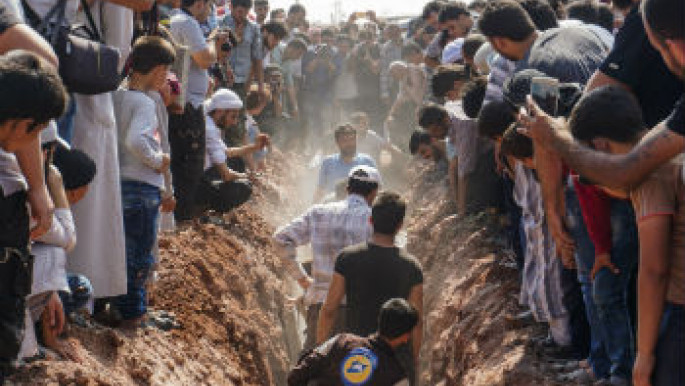Death and life on the Turkish border
Trapped in the besieged city of Douma on the outskirts of Damascus, Bashar Delwan plotted his escape from the Syrian war.
Regime bombs and shelling were devastating his city, while the hardline group Jaish al-Islam ruled with an iron fist.
By May 14, Delwan made his move. He snuck into the nearby town of Qaboon as rebels and families were being forcefully evacuated to Idlib, a province adjacent to the Turkish border.
Boarding the bus and reaching Idlib, Delwan next sought out a smuggler to take him and his two friends to Turkey.
That's where his luck would run out. On May 22, a Turkish border patrol shot and killed Delwan before arresting his friends. He was 26 when he died.
"His brother is traumatised," said Firas Abdullah, a media activist in Douma and a close friend of Delwan's family. "Bashar was just trying to escape to secure a better life."
Although Turkey hosts more than three million Syrian refugees - more than any other country - it has sealed its border since last year. The policy shift has resulted in further bloodshed. In 2016, at least 163 Syrians were killed by Turkish guards while trying to enter clandestinely to claim asylum.
 |
But like past agreements, civilians fear that the ceasefire could collapse at any moment, pushing many to get out while they can |  |
However, Ankara's diplomatic efforts have also offered a glimmer of hope to Syrian civilians. On May 4, President Recep Tayyip Erdogan brokered an agreement with Russia and Iran to establish four "safe zones" in Syria. Idlib is the only region where bombardment has stopped. But like past agreements, civilians fear that the ceasefire could collapse at any moment, pushing many to get out while they can.
'They didn't used to shoot at us'
Sarmada, the closest town to the Turkish border, has a clinic that receives two or three people a day after they are wounded or killed by Turkish patrols. Maen Shurbaji, a nurse and an activist from Daraa province, who volunteers at the clinic, doesn't expect the trend to change.
"There are a lot of Syrian families who are trying to sneak through the informal border," he told The New Arab. "In the past, the guards didn't used to shoot at us. But now they are shooting at anyone who crosses."
| Feature continues below map |
 |
One man, who refused to give his name to The New Arab, said dishonest smugglers can also pose a problem. He, for one, has tried to cross into Turkey twice, but failed after being abandoned on the final part of his journey. Lucky for him, he was arrested by Turkish authorities as opposed to being shot.
"Most smugglers have no morals and no ethics," he said. "When it's time for me to cross again, then all I can do is pray to God to save me. None of us that try [to cross] knows what will happen. Maybe we will succeed or we will die. It depends on our luck."
Not everyone can afford to take such risks. Shurbaji said that most smugglers charge between $500 to $1,500, depending on where the person is escaping from. Some, like Delwan, reached Idlib from areas under siege while others have escaped from cities that the regime has recaptured.
 |
|
| White Helmet rescue workers bury Civil Defence volunteers killed east of Idlib on August 12 [AFP] |
Activists suspect that more civilians will try to cross to Turkey now that Hayat Tahrir al-Sham - Syria's al-Qaeda franchise - is in firm control of Idlib.
The extremist group has again revealed its authoritarian agenda after clashing with rebel groups and cracking down on demonstrators in recent weeks. But the greater fear, said Shurbaji, is that the regime could resume bombing the province under the pretext of fighting terrorism.
The wall
Nearly a million civilians will have nowhere to run if a new carnage begins. Turkey has nearly completed the construction of a 435-mile wall that stretches across the border. The point of the wall is to prevent refugees from entering, while monitoring the movement of insurgents.
With the way it looks now, it seems very few people will pass. The wall is composed of concrete blocks that stand 2.7 metres high and 1.8 metres wide. It also includes 120 watch towers for border guards to survey the border.
 |
Some people who are thinking to cross [into Turkey] know that it's very hard for them to enter now |  |
Omar Abu al-Huda, a civil society activist with Al-Khadraa, a local NGO that educates and provides relief to women and children in Idlib, said that the wall will make it impossible for Syrians to seek asylum in Turkey.
"Some people who are thinking to cross [into Turkey] know that it's very hard for them to enter now," said al-Huda. "Others also wonder about what they will do if they survive the journey and enter Turkey. It will be hard for them to find jobs - and even harder to make a living."
That may be true, but civilians will suffer a far worse fate if bombing resumes. "Safe zones" are generally not safe unless a foreign military is present to ensure security. Official statements from Ankara suggest they are planning to take on that responsibility. Kurdish militants in the north and Hayat Tahrir Al-Sham are consequently on high alert.
Yet Shurbaji says that he would welcome the intervention.
"Many civilians want Turkey to enter Idlib," he said. "We would feel safer if [their military] was here."
Mat Nashed is a Lebanon-based journalist covering displacement and exile. Follow him on Twitter: @matnashed





 Follow the Middle East's top stories in English at The New Arab on Google News
Follow the Middle East's top stories in English at The New Arab on Google News


